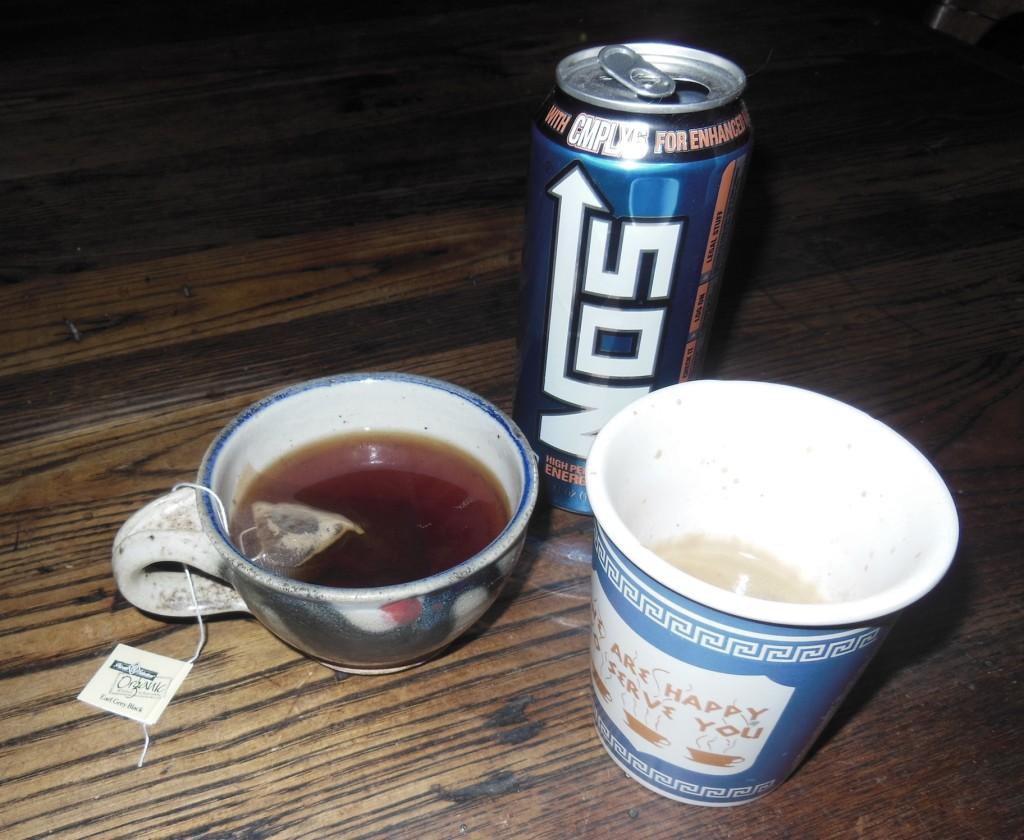Caffeine: Will It Kill You?
November 24, 2013
America is addicted. Caffeinated drinks are everywhere. But are they hurting you? It depends on how you get your fix.
The Federal Drug Administration reviewed the National Health and Nutrition Examination Survey and the Nutrition Intake Database and reported that over 50 percent of the caffeine consumed in the United States comes from coffee, 7.7 percent from food, 10 percent from energy drinks, and the last 32.3 percent from tea and other sources.
If you’re in the 10 percent group, then look out. You’re not just getting caffeine. You’re being poisoned.
Energy drinks were originally created for extreme athletes who just need an extra boost of energy, and it works – at least, temporarily. It’s borrowed energy, but fructose does convert to energy faster in your body than carbohydrates, (disregarding all of the other, crippling effects of Fructose).
What else is in these drinks? Usually: caffeine, creatine, taurine, B-vitamins (B6 and B12), and Guarana. These drugs are all meant to keep you awake, focused, and energized, but what they don’t write on every can is that the combination of Taurine and Caffeine can cause extreme damage to your heart. These drinks can contain as much as 260 mg. of caffeine. Guarana is a plant found in the Amazon that contains very high levels of caffeine, along with Theophylline and Theobromine – drugs that are very similar to caffeine.
Because Guarana is still not recognized as another form of caffeine, it is not included in the caffeine content on the ingredients list, which means you’re getting a lot more than you think.
With all the sugar and additives, along with the risky combinations of drugs, energy drinks are pretty much untouchable.
So, energy drinks are more trouble than they’re worth, but what about coffee and tea? The following graph is a measure of the average caffeine content of various types of coffee and tea:
Most teas have a fairly low amount of caffeine, and can actually help you in some amazing ways.
In every human body there are metabolic byproducts produced that can damage cells. This cell damage can lead to cancer or heart disease. These byproducts are known as oxidants. Tea, however, happens to contain antioxidants. (It detoxifies some harmful substances). This means that on a cellular level, tea can prevent various types of cancer and heart disease.
Green teas have often been used for weight-loss, and can reduce risk of several types of cancer and neurological disorders.
The FDA reported in 2009 that compared to green tea and white tea, black tea has the highest caffeine content, and a 2001 Boston University study concluded that black tea may reduce risk of stroke, cardiovascular disease, and protect lungs from damage caused by cigarette smoke.
White tea is less processed than any other teas, and has the strongest effect in prevention of cancer.
Tea rules. And coffee’s pretty great too. So why does it have such a bad reputation? Well, there are rumors everywhere that coffee’s high levels of caffeine can damage your heart, although, this has not been officially proven yet. The Department of Health Sciences Research at Mayo Clinic in Rochester, Minnesota reported that caffeine may be stealing calcium from drinkers’ bones and, in turn, expediting the effects of osteoporosis in elderly persons. However, the researchers question these results, and no conclusion on the study is officially recognized yet.
Many have wondered if coffee is lethal, and yes, it is… if you drink nearly 100 cups in extremely fast succession. There have only been a few recorded deaths from caffeine. One of the most famous cases was of a man in England, named Michael Bedford, who overdosed by consuming large amounts of caffeine in powder form. It was reported that the amount he ingested was equivalent to over 70 cans of Red Bull. He bought the bag of caffeine powder on the internet.
There are no records of anyone ever dying from drinking too much coffee. All recorded deaths-by-caffeine were caused by either energy drinks, or concentrated caffeine in either pill or powder form.
Coffee can actually have amazing health benefits if you drink the right amount (roughly 3-6 cups daily). It has an odd effect on muscles. Because coffee causes increased heart rate and constricted blood vessels, more blood actually flows to the muscles. This can be good for exercise. Scientists have also proven that drinking coffee and exercising regularly can have a powerful effect in the prevention of skin cancer. Coffee also fights gout symptoms and can help prevent breast cancer.
Coffee can also help fight depression on a small scale, as it increases the amount of dopamine (the happiness drug) in a person’s brain.
In conclusion, enjoy your coffee and your tea. Everything in moderation… including moderation.











